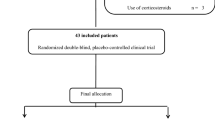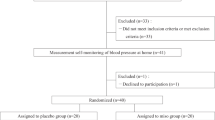Abstract
OBJECTIVES: To examine how the slimming drug, Letigen®, containing ephedrine (E) 20 mg and caffeine (C) 200 mg (E+C), affects blood pressure in normotensive and hypertensive patients treated with adrenergic β-receptor blocking drugs and/or other antihypertensive agents, during a period of six weeks. DESIGN: A double-blind, randomised, placebo controlled study of five parallel groups of overweight patients from general practices. SUBJECTS: One hundred and thirty-six patients with Body Mass Index (BMI)>25 kg/m2 were included consecutively by 25 general practitioners in Denmark and randomized into five groups: (1) Hypertensive patients treated with betablockers and E+C; (2) Hypertensive patients treated with antihypertensive agents other than betablockers, and E+C; (3) Normotensive patients treated with E+C; (4) Hypertensive patients under any antihypertensive treatment+placebo; and (5) Normotensive patients+placebo. All patients were instructed in a 1200 kcal (=5040 kj) diet. RESULTS: Of a total of 136 patients aged 20–74 y, 112 completed the study protocol. Fluctuations in systolic and diastolic blood pressure were seen in all groups. The systolic blood pressure was reduced significantly (5.5 mmHg) in the patients treated with antihypertensive agents other than betablockers, plus E+C. In the other hypertensive groups the reduction in blood pressure was not significant. In normotensive patients treated with E+C, the systolic and the diastolic blood pressure declined significantly (4.4/3.9 mmHg). At the end of the treatment period heart rate had increased significantly (4.9 beats/min) in the group of normotensive patients treated with E+C. Blood pressure and heart rate measured by the patient at home showed similar fluctuations from baseline prior to and during treatment with E+C or placebo. A mean loss of weight of approximately 4 kg in 6 weeks was significant for all the groups. There was no significant difference between the groups during this short period of treatment. In 56% of the patients treated with E+C complaints/side-effects related to the medical treatment were found at questioning. Corresponding complaints occurred in 21% of the placebo treated patients. In the E+C treated group 7% dropped out due to side-effects. In the placebo group there were no drop-outs. CONCLUSIONS: This study does not support the assumption that E+C should cause rises in blood pressure, acutely or during shortterm treatment, in either normotensive or hypertensive obese patients. The antihypertensive effect of the betablockers was not reversed by E+C.
This is a preview of subscription content, access via your institution
Access options
Subscribe to this journal
Receive 12 print issues and online access
$259.00 per year
only $21.58 per issue
Buy this article
- Purchase on Springer Link
- Instant access to full article PDF
Prices may be subject to local taxes which are calculated during checkout
Similar content being viewed by others
Author information
Authors and Affiliations
Rights and permissions
About this article
Cite this article
Ingerslev, J., Svendsen, T. & Mørk, A. Is an ephedrine caffeine treatment contraindicated in hypertension?. Int J Obes 21, 666–673 (1997). https://doi.org/10.1038/sj.ijo.0800457
Received:
Revised:
Accepted:
Issue Date:
DOI: https://doi.org/10.1038/sj.ijo.0800457
Keywords
This article is cited by
-
Herbal simulation of ephedrine and caffeine in treatment of obesity
International Journal of Obesity (2002)



